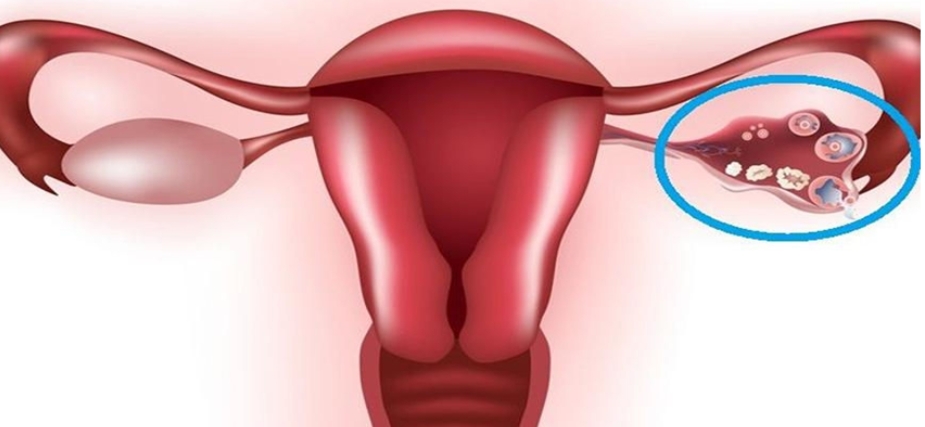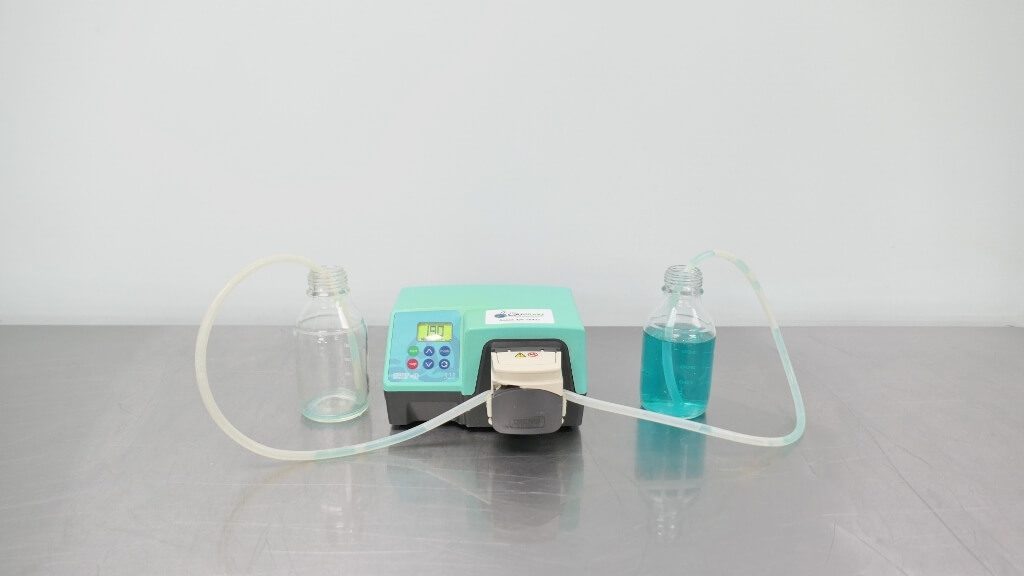
Many people wonder when to see a doctor for ovarian cysts. These fluid-filled sacs on the ovaries often go unnoticed but can cause discomfort and health issues that require professional care.
Ovarian cysts are common during a woman’s reproductive years, affecting millions globally.
One crucial fact is that most ovarian cysts disappear without treatment after a few menstrual cycles.
However, some may cause symptoms like bloating, pain in the abdomen or lower back, and irregular periods which signal the need for medical evaluation.
This article will help you understand when seeking medical advice is necessary and outline potential treatments to manage or eliminate these cysts effectively. Keep reading to learn more about taking care of your ovarian health.
Key Takeaways
- If you feel pain or have changes in your periods, see a doctor. This can mean you have ovarian cysts.
- Some signs, like sudden bad pain, fever, or feeling very sick, require quick help from a doctor. They could mean the cyst is serious.
- Doctors might give medicine or do surgery for ovarian cysts. What they choose depends on the size of the cyst and if it hurts.
- Regular check-ups are important. They can help find ovarian cysts early before they get worse.
- Keeping track of symptoms and changes in your body helps tell when to get medical advice for ovarian cysts.
Understanding Ovarian Cysts

Ovarian cysts are small bags filled with fluid that grow on a woman’s ovaries. They can be simple or complex, and most times they don’t hurt or cause problems.
Types of Ovarian Cysts
Ovarian cysts vary widely, each with distinct traits and origins. They can be harmless or require surgical removal.
- Functional Cysts: These form during a woman’s menstrual cycle. They are the most common type and usually harmless.
- Follicle Cysts occur when the sac doesn’t break open to release an egg, swelling with fluid.
- Corpus Luteum Cysts appear after the sac releases an egg but reseals itself instead of dissolving, accumulating fluid inside.
- Dermoid Cysts (Teratomas): Made up of different types of cells, they can contain hair, skin, or teeth. Despite sounding alarming, they are mostly benign but can grow large and cause discomfort.
- Cystadenomas: These develop from ovarian tissue and can be filled with a watery or mucus-like liquid. Unlike functional cysts, they attach to the ovary and can become quite large.
- Endometriomas: Part of a condition called endometriosis, where tissue similar to the lining inside the uterus grows outside it. These “chocolate cysts” are filled with dark, blood-like fluid and contribute to fertility problems.
- Polycystic Ovary Syndrome (PCOS): This is not a single cyst but many small ones that form when ovulation fails or is irregular. PCOS can lead to other health issues like diabetes.
- Ovarian Torsion: Sometimes large cysts can lead to the twisting of an ovary (ovarian torsion), cutting off its blood supply and causing severe pain.
Common Symptoms
Moving from the types of ovarian cysts, we now focus on common symptoms that women may experience.
These symptoms are important signs that your body is telling you something might be wrong with your ovaries.
- Bloating or swelling in the belly area can make you feel full or heavy.
- Pain in the lower back or thighs feels different from normal aches.
- Pelvic pain right before your period begins or just before it ends is a sign to watch out for.
- Menstrual changes such as unusually heavy or light periods could indicate an issue.
- Spotting between periods is not normal and deserves attention.
- Painful bowel movements can be linked to ovarian cysts pressing on surrounding areas.
- Pain during intercourse often signals something is wrong inside the pelvic area.
- Nausea and vomiting, similar to pregnancy symptoms, can be due to ovarian cysts.
- Severe pelvic pain suddenly appearing can mean a cyst has burst, requiring immediate medical help.
Regular checks like pelvic exams and ultrasounds are key for early detection of any changes in the ovaries.
When to Seek Medical Advice
See a doctor if your pain gets worse or does not go away. If you notice changes in your health or symptoms, it’s time to get help.
Severe Symptoms Indicating Immediate Attention
Ovarian cysts often do not cause symptoms. Yet, certain signs need immediate medical help.
- Sudden, sharp abdominal or pelvic pain signals a possible ruptured ovarian cyst.
- Experiencing pain together with fever or vomiting can mean an infection linked to the cyst.
- Signs like cold, clammy skin, rapid breathing, lightheadedness, or weakness show shock and need urgent care.
- Severe pain that comes with feeling dizzy requires fast action to prevent serious complications.
- Pain that gets worse with fever or nausea and vomiting could point to an inflamed pelvic area.
- Heavy bleeding in the pelvis might indicate a cyst has burst and is causing internal damage.
Each sign points toward different but critical conditions that need swift evaluation by healthcare experts to prevent further harm to the reproductive system.
Changes in Cyst Size or Pain
It is crucial to track the size and pain linked to ovarian cysts. Cysts larger than 5-10 centimetres often need removal. Functional cysts, however, might shrink by themselves in 1 to 3 months.
Paying close attention to these changes helps decide if surgery, like a laparoscopy or a more extensive procedure, becomes necessary. Procedures are chosen based on factors such as age and the cyst’s characteristics.
Feeling sudden increases in pain can signal serious issues like twisting of the ovary or rupture, both demanding immediate doctor visits. Regular pelvic exams play a key role in early spotting of any changes, aiding timely intervention before conditions worsen.
If prescribed hormonal birth control fails to stop new cysts from forming after previous ones have treated through medication or surgery, this also indicates a need for professional advice.
Possible Treatments for Ovarian Cysts
Doctors may use medicines or surgery for ovarian cysts. They choose based on the cyst’s size and if it causes pain.
Medication
Doctors often prescribe hormonal birth control to prevent ovulation. This method helps manage ovarian cysts by reducing their risk of forming again. For painful symptoms, over-the-counter pain relievers offer quick relief.
Hormonal treatments, including medication that regulates the menstrual cycle, also play a key role in managing these cysts.
Painful symptoms from ovarian cysts can be treated effectively with medication.
Medications such as birth control pills prevent new cysts and lower the chances of ovarian cancer for those in childbearing years.
For those experiencing severe discomfort, specific hormone medications like progesterone can help balance irregularities within the female reproductive system, providing significant relief from symptoms associated with ovarian cysts.
Surgical Options
Surgical options for ovarian cysts offer solutions depending on the size and type of cyst. They range from minimally invasive methods to more complex surgeries.
- Laparoscopy is used for smaller cysts. Surgeons make tiny incisions near the belly button to insert a laparoscope, a thin tube with a camera, into the cyst and remove it.
- For larger or suspicious cysts, laparotomy is preferred. This procedure involves bigger cuts in the abdomen allowing doctors to access and inspect larger areas.
- Cystectomy targets the removal of the cyst while preserving the ovary. This option supports women who wish to maintain fertility.
- In cases where cysts are cancerous or if there’s significant risk, oophorectomy, removing one or both ovaries, might be necessary.
- If a cyst is linked with cancer or other serious conditions affecting the reproductive system, such as severe endometriosis or pelvic inflammatory disease, a hysterectomy—removing the uterus—may be advised.
- Postmenopausal women with ovarian cysts often require surgery due to increased risk of cancer. The exact approach depends on factors like overall health and whether malignancy is suspected.
- Emergency surgery for ruptured ovarian cysts may involve stopping internal bleeding and removing any damaged tissue.
Conclusion
See a doctor if you have bloating, pressure, or pain in your belly. If periods hurt or come late, that’s another sign to get help.
Call right away if you feel very bad pain suddenly with fever or throwing up.
Doctors can use sound wave scans to check for cysts and might suggest medicine or small surgery to fix the problem. Make sure you go for regular health checks so doctors can find any issues early on.
FAQs
1. When should I see a doctor for an ovarian cyst?
See a doctor if you experience severe pelvic pain, abdominal bloating, or difficulty getting pregnant. These symptoms may indicate the presence of ovarian cysts.
2. Are all ovarian cysts cancerous?
No, most ovarian cysts are non-cancerous. However, post-menopause ovarian cysts require evaluation by obstetricians and gynaecologists to rule out malignancy.
3. Can fertility drugs cause ovarian cysts?
Yes, fertility drugs like clomiphene can stimulate the ovaries and lead to the formation of functional ovarian cysts during ovulation.
4. How do doctors diagnose ovarian cysts?
Doctors use pelvic ultrasounds or sonograms to view the ovaries and diagnose cysts accurately.
5. What treatments are available for large or painful ovarian cysts?
Treatment options include hormonal contraceptives to prevent new cyst formation or surgery through small incisions to remove the cyst if it’s large or causes significant discomfort.
6. Does having an ovarian cyst affect pregnancy chances?
Functional ovarian cysts typically don’t hinder conception and may dissolve on their own. However, if you’re experiencing difficulty getting pregnant, consult with your doctor for an appropriate assessment and treatment plan.




